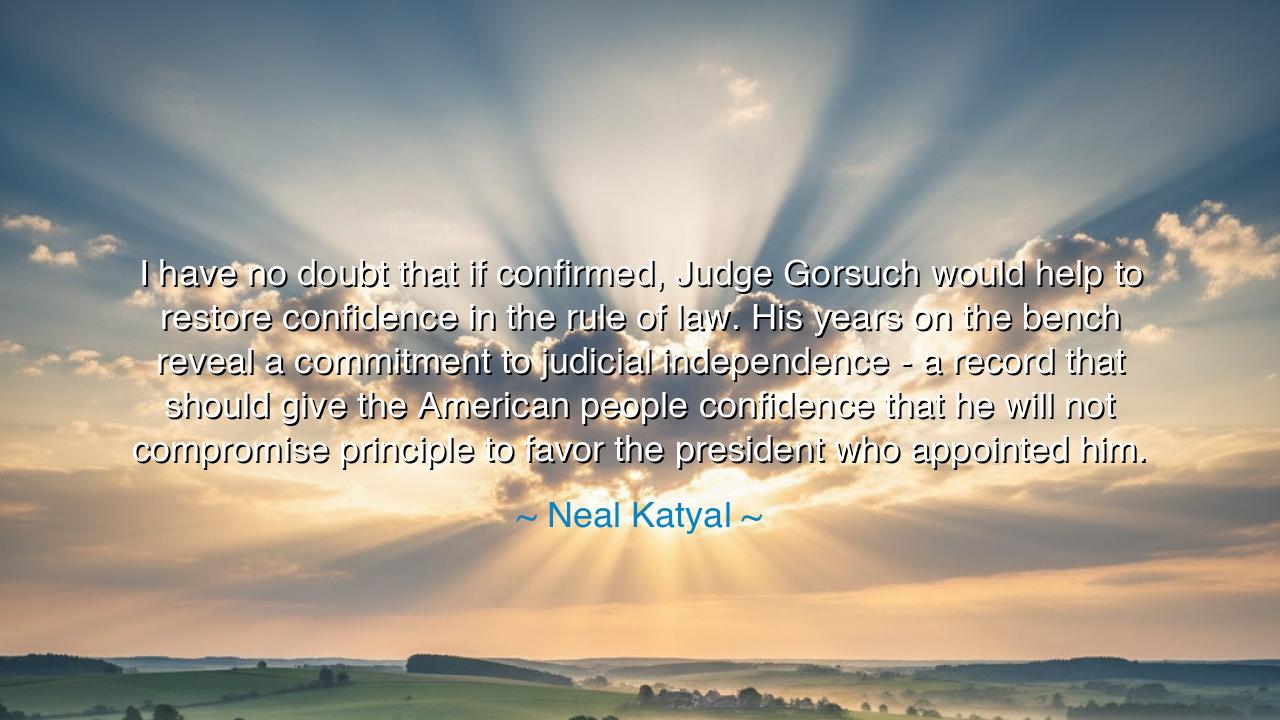
I have no doubt that if confirmed, Judge Gorsuch would help to
I have no doubt that if confirmed, Judge Gorsuch would help to restore confidence in the rule of law. His years on the bench reveal a commitment to judicial independence - a record that should give the American people confidence that he will not compromise principle to favor the president who appointed him.






The words of Neal Katyal speak with the solemn gravity of one who understands that the rule of law is not merely a mechanism of governance, but the very heartbeat of civilization. “I have no doubt that if confirmed, Judge Gorsuch would help to restore confidence in the rule of law. His years on the bench reveal a commitment to judicial independence — a record that should give the American people confidence that he will not compromise principle to favor the president who appointed him.” In these words lies a call to remember that justice, to remain just, must stand above power, above politics, and above pride. The judge, in his truest form, must serve not man, but the moral order that binds men together.
From the dawn of human law — from the stone tablets of Hammurabi to the scrolls of Rome — the world has wrestled with the same sacred question: Who guards the guardians? The answer, though whispered through ages, remains unchanged — it is principle that guards them. For when a judge bows to kings or rulers, the law ceases to be a shield for the people and becomes instead a weapon of tyranny. Thus, Katyal’s praise of judicial independence is not mere endorsement; it is a reminder that the soul of democracy depends upon those who wield authority without being seduced by it.
Consider the tale of Sir Edward Coke, the great English jurist who, in the 17th century, stood before King James I and declared that even the monarch was subject to the law. “The king,” he said, “is under no man, but under God and the law.” For this defiance, he was dismissed from office, yet his courage birthed the idea that would later echo in the American Constitution — that the law must stand above the ruler, and justice must never kneel before power. The spirit of that defiance lives in Katyal’s faith that a true judge, like Judge Gorsuch, will protect principle even when pressured by politics.
Judicial independence is not an ornament of democracy; it is its foundation. Without it, the courts become mirrors of the powerful rather than windows of truth. A judge who fears the disfavor of presidents or parties is no longer a judge, but a clerk of authority. It is only through steadfast devotion to the rule of law — blind to favor, firm against fear — that nations can trust their own institutions. The people’s confidence is not born from verdicts that please them, but from verdicts that are fair even when they do not.
And yet, independence is not isolation. The just judge, though unmoved by influence, must still be guided by wisdom and compassion. Law, without mercy, becomes tyranny; mercy, without law, becomes chaos. The harmony of both is what makes the judiciary sacred. When Katyal speaks of restoring confidence, he speaks also of restoring faith — faith that there still exist men and women in robes who remember that their first duty is to truth, not to throne.
Look to history, and you will see this lesson etched in every age. When the Nuremberg Trials ended the silence after World War II, the judges who presided there did not serve victors or vanquished — they served humanity itself. They reminded the world that even amidst ruin, there can be justice; even after horror, there can be order. Theirs was not vengeance, but principle — the same principle that Katyal invokes: that law must remain pure even when wielded by flawed hands.
Thus, let all who hear this reflection remember: the rule of law is not a relic of parchment, but a living covenant. It survives only so long as those who interpret it do so without fear or favor. Every citizen, in turn, must guard this independence as fiercely as any frontier, for when the courts are compromised, freedom falls silently — not with battle cries, but with the quiet corruption of trust.
And so, the lesson endures. Whether in a courtroom or in one’s own heart, let no principle be surrendered for convenience, no truth be bartered for loyalty, no conscience be silenced by command. For in the end, the strength of a nation lies not in its armies or wealth, but in its justice that bows to none but righteousness. And if we hold to that — as Katyal so fervently reminds — then the flame of liberty will never be extinguished, and the temple of law will stand unbroken through the ages.






AAdministratorAdministrator
Welcome, honored guests. Please leave a comment, we will respond soon